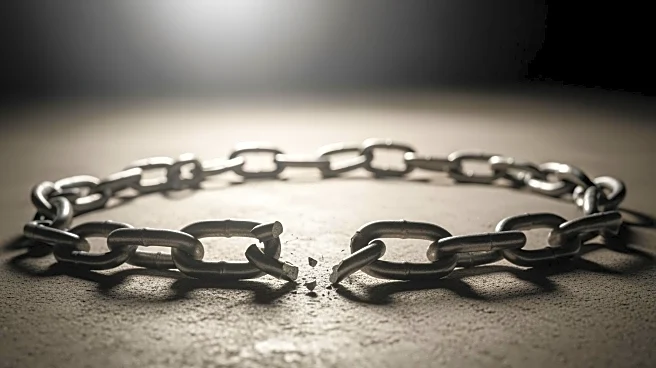What's Happening?
A trial has commenced in Paris for ten individuals accused of engaging in sexist cyber-bullying against Brigitte Macron, the wife of French President Emmanuel Macron. The defendants, including an elected
official, a gallery owner, and a teacher, face charges related to spreading unsubstantiated claims about Mrs. Macron's gender and sexuality, as well as making derogatory remarks about the age difference between her and her husband. If convicted, they could face up to two years in prison. This case follows previous legal actions where two of the accused, Natacha Rey and Amandine Roy, were initially found guilty of slander for claiming that Brigitte Macron never existed and that her brother had assumed her identity. However, they were later acquitted on appeal. The Macrons are appealing this acquittal.
Why It's Important?
The trial highlights the ongoing issue of cyber-bullying and the spread of misinformation, particularly targeting public figures. The case underscores the challenges faced by individuals in the public eye, especially women, who are often subjected to gender-based attacks. The outcome of this trial could set a precedent for how similar cases are handled in the future, potentially influencing legal standards for online conduct and the protection of personal reputations. Additionally, the involvement of right-wing influencers in propagating these claims points to the broader issue of misinformation and its impact on public discourse.
What's Next?
The trial is expected to continue over the coming days, with potential implications for the defendants if found guilty. The Macrons' legal actions against other parties, such as right-wing influencer Candace Owens, are also ongoing, as they seek to address the spread of false information. The case may prompt further discussions on the responsibilities of social media platforms and influencers in curbing the dissemination of harmful content.
Beyond the Headlines
This case also touches on the cultural and ethical dimensions of privacy and the right to personal dignity, especially for public figures. It raises questions about the balance between free speech and the protection against defamation and harassment. The trial could influence future legal frameworks and societal norms regarding online behavior and the accountability of those who engage in cyber-bullying.









